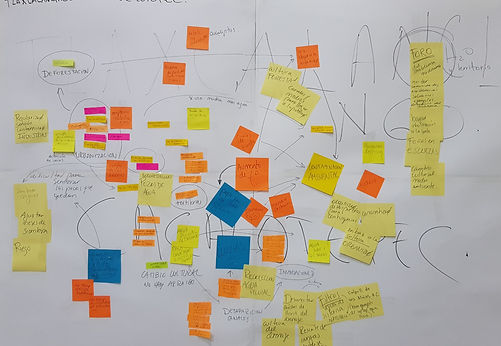Project Summary
Increasing urbanisation along the edge of Medellin, characterised by informal growth influenced by (internal) conflict- and environmentally-based displacement, has produced vulnerable peri-urban areas that are exposed to risks, increasing with climate change. Understanding ‘habitat’ as ‘socially constructed’, where each individual’s input forms the collective ‘state of being’ within which they live (Latour 2005), this project aims to develop transdisciplinary knowledge and build capacity for policy implementation, through identifying and testing water management infrastructure solutions that are at the intersection of technical, social and environmental knowledge, to reduce environmental risks. This proposal’s innovative approach is rooted in the co-production of infrastructure solutions through climate-change participatory methodologies that engage local community knowledge, technical appraisals and institutional policy design and implementation. This will include identifying and scoping joint decision-making between communities and government agencies around neighbourhood planning in the rural-urban edge, aimed at reducing structural inequalities and risk, increasing social equity and wellbeing.
Objectives
The processes of communal water management in Medellin began approximately in the 1980s, when families internally displaced by armed conflict arrived to occupy the eastern slopes of the Aburra Valley. However, as the process of urbanisation increased, water inequalities in relation to access, distribution, availability and uses, became evident with ‘13% of homes in Medellin disconnected from water services due to that they are located in high risk areas’ (López, 2016).
Over the past 40 years, communities in these vulnerable areas of the city have developed processes of internal organisation such as Communal Action Boards (JAC), Water Committees and Neighbourhood Committees for the Defence of the Territory, which have carried out collective work for the improvement of communal water and risk mitigation, two key challenges in ensuring well-being and suitable conditions for inhabitation. Added to these challenges is the intense urbanisation of these areas due to the national armed conflict, not only in relation to the increasing incoming population but also with the manifestation of new forms of power relations over the control of services, such as water, by armed groups, which were previously involved in conflict wars and are now looking for new sources of income.
Pollution and deforestation around water sources, hydraulic works in deprived condition, community fragmentation and power relations, the lack of state capacity to intervene, pressure from large business providers of water services in the city, among others, have generated conflicts, diseases, (i.e. gastrointestinal) and increasing environmental risks, due to the infiltration of water. These factors are affecting the living conditions of the inhabitants along the NE sector of Medellin, selected area for this study, with estimated over 6000 dwellings located in areas of high risk, no mitigable (in Comuna 3 and Comuna 8, see further details below). These risk conditions are exacerbated by climate change, with the city experiencing increasing rainfall, estimated at 9% by 2049, a situation Medellin is not prepared for. In addition and due to the characteristics of the soil of the city's slopes, this future does not only represent more water to be retained in the land, but also the potential for greater or more frequent landslides that affect communities’ fragile infrastructures and ultimately prevent access to water.
Research by Universities in Colombia and the UK around risk monitoring and mitigation at the household level, with a focus on landslides, has demonstrated that working directly with communities can lead to increased awareness and knowledge (UNAL, HWU, UoE). This indicates that communities are willing to interact and negotiate with institutions in setting up strategic approaches to minimize risks. Universidad de Antioquia (UA) and Universidad Nacional (UNAL) have also led diagnostic research on the broader NE sector of the city around water management infrastructures, which is providing knowledge to the Municipal government when managing risk. This work has identified the different threatening factors, for the guarantee of the citizens’ right to water, such as: mass movement, earthquakes, flooding, torrential avenue, forest fires, agrochemicals, fuel spills, deforestation and sewage collection. In addition, this work has established the levels of social fragility and marginalisation of the population, and finally, it has evaluated the state of the infrastructures of all the aqueducts in the NE sector of the city. This research has also led to identifying the role and nature of government institutions for management and monitoring the territory in line with the Municipal Risk Management Plan and the Municipal Emergency Strategy, and in articulation with the organisation that manages satellite data for early warning in Medellin and the Aburra Valley (SIATA).
Such previous research projects are generating overarching technical knowledge but leave a research gap around community-based knowledge and how water management risk reduction solutions can be implemented based on such knowledge, through communities and government organisations alike. Although initial management mechanisms have been identified through dialogue between local community boards and government organisations, ongoing research has not been able to develop and test appropriate water management infrastructure solutions, that engage with national and local investment programmes for neighbourhood improvement, which this project aims to contribute to. It is from these established negotiation channels that the infrastructure solutions this project seeks to explore will emerge. Solutions to develop would entail blurring the distinction between formal and informal infrastructures when ensuring wellbeing and the right to water in vulnerable areas. This will be achieved through gaining a better understanding of the different scales of infrastructures networks in relation to levels of responsibility, i.e. family/household, groups of neighbouring houses, community network at the neighbourhood level, and public network with institutional responsibility.
Although increasing risk awareness has generated significant national and local policy changes in Colombia, there has been little development in relation to the implementation of these policies nor the provision of suitable and inclusive infrastructures. An appropriate interaction across government organisations and between these government organisations and communities, in order to ensure that sustained change is achieved, is lacking. This project is therefore aligned with the increasing need for focused negotiation platforms in Medellin, where local government agencies and communities work collaboratively, combining resources and creating joined efforts. Drawing on the above ongoing research, this project will also build on community analysis, training programmes and community-readable representations of risk and hazards, that have been the focus of research at UA.
The overarching aim of this project is to develop transdisciplinary knowledge and build capacity for policy implementation, through identifying and testing water management infrastructure solutions that are at the intersection of technical, social and environmental knowledge, to reduce environmental risk in informal, vulnerable areas.
The project will thus develop and test three pilot infrastructure solutions in peri-urban areas that address a range of water-related challenges, contributing to current debates, as well as knowledge and policy development in the city around risk reduction. The problem-focused nature of this proposal builds on ongoing research involving the partners in this study around water-related risks, and broadens the research team to additional Colombian academic organisations (UA) as well as local government institutions (DAGRD and the Planning Department), community representatives, residents and NGOs (Convivamos and Corporación Penca) in order to achieve a range of negotiated risk reduction strategies in the intersection of rural and urban conditions. The proposed programme will work across scales and urban sectors developing and testing affordable water management infrastructure solutions, linking formal and informal knowledge, and their implementation, in line with government policy.
The above aim will be achieved through meeting the following objectives:
-
POLICY CONTEXT: To understand the implications of the current policies and strategies linked to risk management and infrastructure solutions for spatial planning, housing and resource allocation within Colombia’s cities generally and within Medellin, with a specific focus on water management in vulnerable areas.
-
ONGOING RESEARCH/TECHNICAL DIAGNOSTIC STUDIES: To explore the ‘carrying capacity’ of urban fringe areas as receptors of population movements resulting from current conflict, post-conflict and climate change processes, analysing socio-economic and environmental factors, from community, government and technical research perspectives. This is essential for the development of strategic approaches and associated water management infrastructures that address the systemic nature of risk management.
-
COMMUNITY KNOWLEDGE & LOCAL DYNAMICS: To understand the territorial dynamics and capacity that are taking place in the rural-urban interface, from the perspective and experience of selected communities in relation to water risk-management.
-
PILOT IMPLEMENTATION AND TESTING: To collaboratively develop, build prototypes and test affordable infrastructure solutions (aimed at: reducing floodwater; providing safety for pedestrians and households; and retaining as much water as possible before it infiltrates in the ground, i.e. vegetative stone pitching, open channels, low-high dams, etc.) and identify mechanisms for a sustainable process, implementation and management of water-related risk, which contribute to socio-economic equity and wellbeing in peri-urban and urban fringe areas. This will be rooted in generating engagement between communities and relevant government organisations, initially at four geographical scales: main drainage under the responsibility of the municipality; community street level along lanes and stairways under responsibility of neighbourhood association; at lane and ally level, responsibility of a group of houses; and at residential level, responsibility of house owners.
-
POLICY IMPLEMENTATION & UPSCALING: To engage with government institutions and communities in the implementation and upscaling of the developed water management infrastructure solutions as well as community-government mechanisms for water supply, across the NE urban fringe of Medellin.
A qualitative and participatory research approach will be applied in the three specific case study areas within Medellin, showcasing low-income informal communities in the NW area of the city: one consolidated peri-urban settlement (El Pacifico/Pinares de Oriente in Comuna 8, located in the Iguana basin) and the other two still in process of consolidation urban fringe settlements located in rural ground (Bello Horizonte & San Jose la Cima 2, in Comuna 3, located in La Bermejala basin). These case study areas offer the opportunity to explore the urban-rural nexus within the dynamics of populations arriving in and moving around the city (including displaced people). In addition, and linked with ongoing diagnostic research carried out by Colombian Universities, these areas offer the opportunity to explore the implementation of water-related supply and risk management solutions within spatial planning and housing-related policies, interlining local community and technical knowledge. For example, Medellin Municipality (supported by academic research), has identified water-related supply and risk management issues in the past such as: supply pipes should be flexible to support seismic activity, which the current infrastructure does not provide and an absence of monitoring mechanisms for water quality, which should focus of governmentcommunity- led programmes. Comuna 8 presents around 70% of land classified as 'Multi-hazard 3', showing the highest levels of flooding. This area has been prioritised in future risk scenarios for Medellin, as it is expected to be the most affected by landslides, due to potential human and physical losses. Comuna 1 presents around 40% of its land classified under 'Multi-hazard 1', with highest levels of landslides.
Our research aims to address these issues through the co-creation of infrastructure solutions that address social, economic and environmental considerations in the case study areas, in the context of climate change. Past and ongoing research partnerships have established working relationships and contacts with communities and government agencies in all three neighbourhoods, providing a sound basis to deliver the proposed project in the limited timescale.











